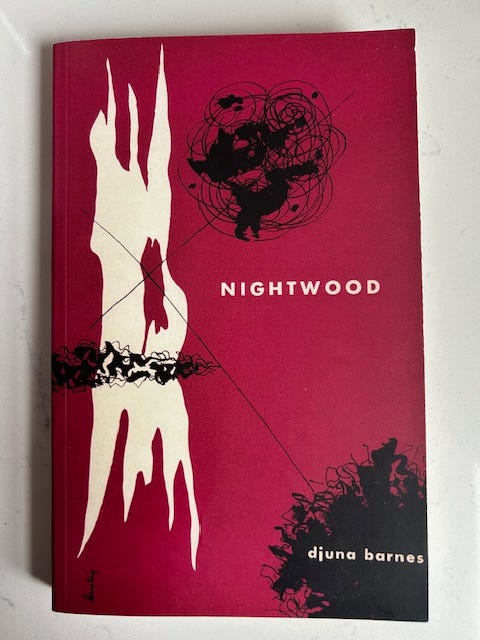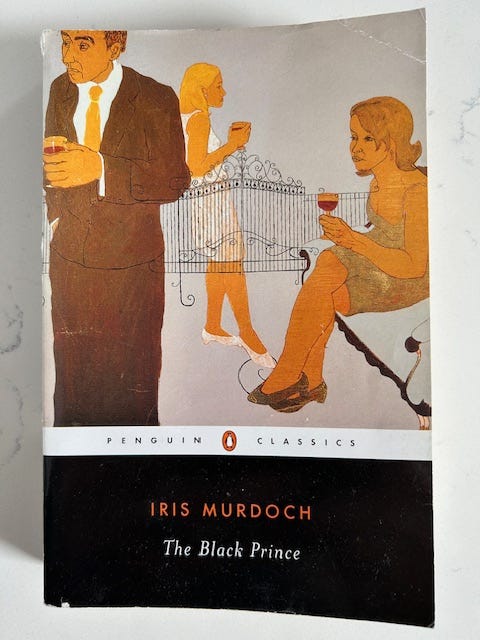'Nightwood' by Djuna Barnes
'Love becomes the deposit of the heart, analogous in all degrees to the "findings" in a tomb.'—Review #231

You’re reading this review of ‘Nightwood’ by Djuna Barnes thanks to the independent yet essential efforts of three people: Roxanna Asgarian, T. S. Eliot and the woman behind the cash register at Books Are Magic. I’ll explain. A few weeks ago, Roxanna recommended the novel to me over Instagram—I stashed the title in my brain. Then, shortly thereafter, while I was waiting for Donna to finish getting a haircut, I popped into the Smith Street book store and saw this copy. The woman who rang it up flipped it over to read the blurb on the back. I broke out in an anxious sweat—would my choice be disdained? But she handed it back and said, earnestly, ‘This looks interesting! Come back and tell me how it is when you finish it.’ I’m not going to do that, that’s maniac behavior, but the fact she found the book interesting inspired me to move it up on my list, because bookstore workers, just like record-store workers of old who begrudgingly tipped their hat at checkout, should always be heeded when they give their approval. When I started to read, however, I made slow progress. As you’ll see in the excerpt below, the text is dense and requires full concentration to follow. I remembered something Eliot wrote in his introduction, that ‘Nightwood’ is best read with a poet’s sensitivity, and that it should be read more than once to be appreciated. There was no way I’d have had the time to get to the end and start over, but I realized I could listen to the audiobook version during my commute. So that’s what I did, and for the first time in Books on GIF history, I read the same book twice, at the same time. Long story, short: What a book! I’m excited to tell you about it.
Here’s the book’s cover:
‘Nightwood’ follows the emotional destruction wrought by Robin Vote, an androgynous and hard-partying American woman living in Europe between the world wars. We meet Robin passed out on the floor of a Paris hotel where an unlicensed doctor, Matthew O’Connor, has been summoned from a nearby café to revive her. He has brought an acquaintance, a monocle-wearing and self-styled ‘Baron’ named Felix who, as you’ll see below, is Jewish, but comes from a family that conjured a backstory linking them to European aristocracy in order to blunt antisemitism. Felix’s mastery of several languages has landed him a post at a bank, but he spends his off-hours pining for the return of old-world nobility (I love the line where he takes a Paris apartment because Bourbons had once been hauled to the guillotine from it) and hanging out with circus performers and other eccentrics. Felix digs Robin and eventually asks her to marry him. She’s like:
Robin soon is pregnant, but she never settles into domestic life. She continues to drink and carouse, and often disappears for days on end. Once she gives birth, to a child named Guido, she becomes enraged, says she doesn’t want the child, and leaves for good. She hooks up with Nora Flood, who runs a salon of artists, intellectuals and society outcasts, but Robin eventually leaves her, too, moving on to a woman named Jenny. Cast aside, Felix and Nora individually seek advice from the doctor, O’Connor, who, despite being a BS artist and a drunk, offers counsel. He weaves long meditations on love, sexuality, culture and religion, among other things, with gossip about Robin into gorgeous tapestries of speech that are hilarious, profound and, at times, inscrutable. Both Nora and Felix want to understand Robin, and believe the doctor, acting as a kind of rambling therapist, can help solve the mysteries behind her harmful behavior. Why does it seem that she’s seeking a home, yet flees whenever one is offered? Why does she ghost people who love her? Why does she drink to oblivion among creepy sailors and men? They ask:

I’m not sure even Robin knows. We never hear her side of things; we see her in the negative space created by the recollections of people she’s left behind. But it’s fascinating to contemplate. Is she just sowing her oats? Is she escaping trauma? Or is she a psychotic?
I can’t stress enough the importance of Eliot’s guidance for enjoying ‘Nightwood.’ Barnes’s writing is beautiful and intricate, and full of subtle meanings. It’s best not to try to follow the plot literally, but emotionally instead, as if you’re listening to a dirge sung in an unfamiliar language—you might not catch all the words, but you get what’s important. And I’m happy I listened to the ‘Nightwood’ audiobook on Spotify while I was reading. I often had to go back and reread pages because I’d gotten lost, but Gemma Dawson’s narration helped reinforce what I had read and revealed details and nuances I had missed on the page. She made the story come to life in my mind, and the characters became even more compelling, even second-tier players like Jenny—I’ll be thinking for a long time about her chilling habit of appropriating other people’s objects, memories and even their prayers (the scene where she blows out someone’s church candle and relights it was stunning). I’ll also be thinking about the ending, which I won’t spoil here. It’s so wild and so intense! Did someone die? Did someone become a werewolf? I’m like:

Donna and I share a wall-length bookshelf, she has one side and I have the other, and usually I can recall the books in each of our collections. When I got home with my copy of ‘Nightwood,’ however, I was surprised that I had somehow overlooked that Donna already owned it. Whenever this has happened in the past, I’ve gotten rid of the duplicate from my side of the shelf (Donna usually has the more interesting edition), but this time, I’m keeping mine, too. I loved ‘Nightwood.’ It’s a haunting story, and a fascinating exploration of relationships and gender and sexual identity that, despite being first published in the 1930s, is still relevant today. If you’re up for a challenging yet rewarding read, you should take Roxanna’s, T.S. Eliot’s and my advice and read this book.
An opening excerpt:
Early in 1880, in spite of a well-founded suspicion as to the advisability of perpetuating that race which has the sanction of the Lord and the disapproval of the people, Hedvig Volkbein—a Viennese woman of great strength and military beauty, lying upon a canopied bed of a rich spectacular crimson, the valance stamped with the bifurcated wings of the House of Hapsburg, the feather coverlet an envelope of satin on which, in massive and tarnished gold threads, stood the Volkbein arms—gave birth, at the age of forty-five, to an only child, a son, seven days after her physician predicted that she would be taken.
Turning upon this field, which shook to the clatter of morning horses in the street beyond, with the gross splendour of a general saluting the flag, she named him Felix, thrust him from her, and died. The child’s father had gone six months previously, a victim of fever. Guido Volkbein, a Jew of Italian decent, had been both a gourmet and a dandy, never appearing in public without the ribbon of some quite unknown distinction tinging his buttonhole with a faint thread. He had been small, rotund, and haughtily timid, his stomach protruding slightly in an upward jutting slope that brought into prominence the buttons of his waistcoat and trousers, marking the exact centre of his body with the obstetric line seen on fruits—the inevitable arc produced by heavy rounds of burgundy, schlagsahne, and beer.
The autumn, binding him about, as no other season, with racial memories, a season of longing and of horror, he had called his weather. Then walking in the Prater he had been seen carrying in a conspicuously clenched fist the exquisite handkerchief of yellow and black linen that cried aloud of the ordinance of 1468, issued by one Pietro Barbo, demanding that, with a rope about his neck, Guido’s race should run in the Corso for the amusement of the Christian populace, while ladies of noble birth, sitting upon spines too refined for rest, arose from their seats, and, with the red-gowned cardinals and the Monsignori, applauded with that cold yet hysterical abandon of a people that is at once unjust and happy, the very Pope himself shaken down from his hold on heaven with the laughter of a man who forgoes his angels that he may recapture the beast. This memory and the handkerchief that accompanied it had wrought in Guido (as certain flowers brought to a pitch of florid ecstacy no sooner attain their specific type than they fall into its decay) the sum total of what is the Jew. He had walked, hot, incautious and damned, his eyelids quivering over the thick eyeballs, black with the pain of a participation that, four centuries later, made him a victim, as he felt the echo in his own throat of that cry running the Piazza Montanara long ago, “Roba vecchia!”— the degradation by which his people had survived.
My Rating:

‘Nightwood’ by Djuna Barnes was published by Harcourt, Brace & Co. in 1937, and by New Directions in 1946, 1961, 2006 and 2016. 180 pages. $13.90 at Bookshop.org.
New to the TBR:
‘Bonjour Tristesse’ by Françoise Sagan (Lofty Pigeon Books)
‘The Employee’ by Olga Ravn (Lofty Pigeon Books)
Books on GIF does not solicit review copies. We feature books we purchase at independent bookstores around New York City and on our travels, or were borrowed electronically from the Brooklyn Public Library.
What’s next:
Before you go:
ICYMI: Review #230
Read this: My newsletter colleague
has written a tremendous and powerful personal essay for ‘Other Mother’ is a must read.Note this: I am excited for the forthcoming release of a collection of fiction by Djuna Barnes by McNally Editions called ‘I Am Alien to Life: Selected Stories.’ It’s edited by and includes a foreword from Merve Emre, an academic and book reviewer I greatly admire. I’m all over this when it comes out in October.
See this: Anna Morrison, the artist who designed the cover of Eva Baltasar’s ‘Boulder,’ is selling prints of her book-related art. I loved the ‘Boulder’ cover, so I ordered one. Check it out!
If you enjoyed this review:
Thanks for reading, and thanks especially to Donna for editing this newsletter!
Until next time,

MPV












Loved reading how this came on your radar! I've never heard of this at all but after your review and so many people's endorsements, it looks like a must!
I read Nightwood in college and even at that questionable age I remember loving it. Wonderful review you always make me chuckle